Sociology Assignment: Interview Analysis of Tehrangeles Culture
VerifiedAdded on 2023/04/23
|7
|1464
|284
Report
AI Summary
This report presents an analysis of an ethnographic interview conducted with a 65-year-old Iranian resident of Los Angeles, focusing on the cultural changes, family structures, and class dynamics within the Iranian community, often referred to as Tehrangeles. The interview explores the interviewee's experiences with immigration, ethnicity, and cultural identity, highlighting shifts in cultural patterns and the evolution of ethnic boundaries. The report examines the interviewee's perspectives on assimilation, social settings, and the impact of the Islamic revolution. The analysis delves into the interviewee's adaptation to American culture, the preservation of cultural heritage, and the integration of psychological and social dimensions of ethnicity. The conclusion emphasizes the significance of understanding ethnicity in fostering relationships among people and the evolving cultural landscape of the Iranian community in Los Angeles.
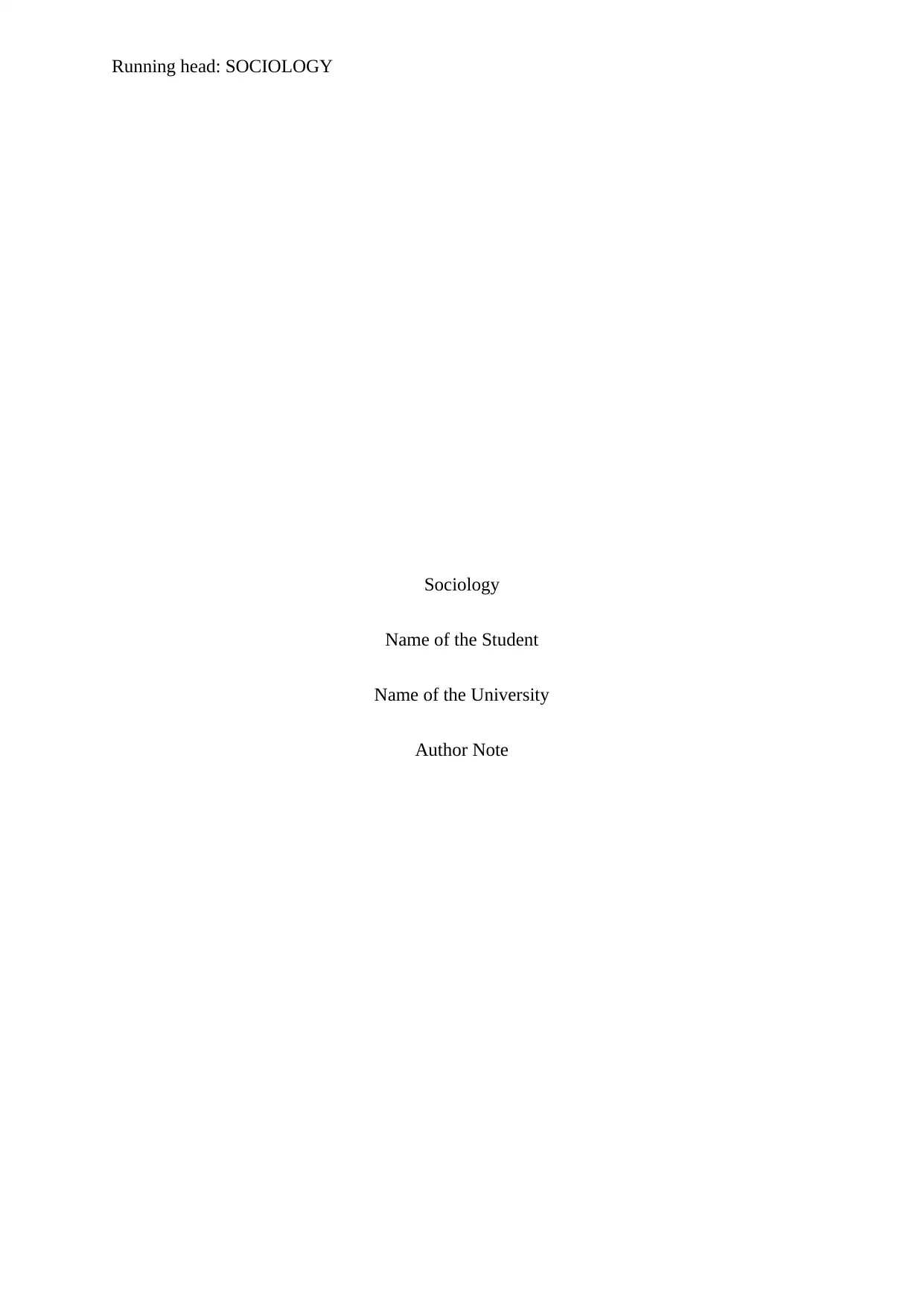
Running head: SOCIOLOGY
Sociology
Name of the Student
Name of the University
Author Note
Sociology
Name of the Student
Name of the University
Author Note
Paraphrase This Document
Need a fresh take? Get an instant paraphrase of this document with our AI Paraphraser
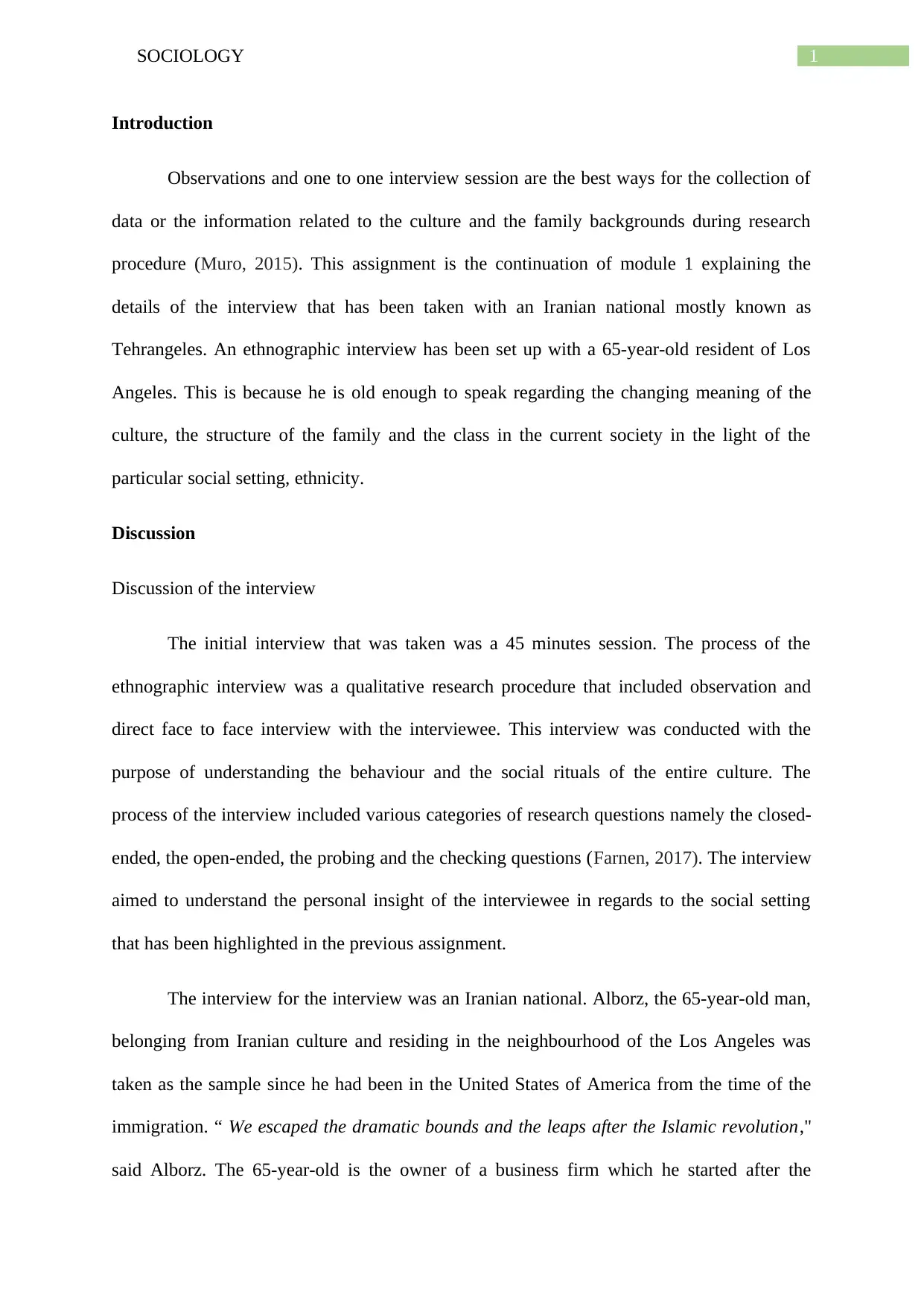
1SOCIOLOGY
Introduction
Observations and one to one interview session are the best ways for the collection of
data or the information related to the culture and the family backgrounds during research
procedure (Muro, 2015). This assignment is the continuation of module 1 explaining the
details of the interview that has been taken with an Iranian national mostly known as
Tehrangeles. An ethnographic interview has been set up with a 65-year-old resident of Los
Angeles. This is because he is old enough to speak regarding the changing meaning of the
culture, the structure of the family and the class in the current society in the light of the
particular social setting, ethnicity.
Discussion
Discussion of the interview
The initial interview that was taken was a 45 minutes session. The process of the
ethnographic interview was a qualitative research procedure that included observation and
direct face to face interview with the interviewee. This interview was conducted with the
purpose of understanding the behaviour and the social rituals of the entire culture. The
process of the interview included various categories of research questions namely the closed-
ended, the open-ended, the probing and the checking questions (Farnen, 2017). The interview
aimed to understand the personal insight of the interviewee in regards to the social setting
that has been highlighted in the previous assignment.
The interview for the interview was an Iranian national. Alborz, the 65-year-old man,
belonging from Iranian culture and residing in the neighbourhood of the Los Angeles was
taken as the sample since he had been in the United States of America from the time of the
immigration. “ We escaped the dramatic bounds and the leaps after the Islamic revolution,"
said Alborz. The 65-year-old is the owner of a business firm which he started after the
Introduction
Observations and one to one interview session are the best ways for the collection of
data or the information related to the culture and the family backgrounds during research
procedure (Muro, 2015). This assignment is the continuation of module 1 explaining the
details of the interview that has been taken with an Iranian national mostly known as
Tehrangeles. An ethnographic interview has been set up with a 65-year-old resident of Los
Angeles. This is because he is old enough to speak regarding the changing meaning of the
culture, the structure of the family and the class in the current society in the light of the
particular social setting, ethnicity.
Discussion
Discussion of the interview
The initial interview that was taken was a 45 minutes session. The process of the
ethnographic interview was a qualitative research procedure that included observation and
direct face to face interview with the interviewee. This interview was conducted with the
purpose of understanding the behaviour and the social rituals of the entire culture. The
process of the interview included various categories of research questions namely the closed-
ended, the open-ended, the probing and the checking questions (Farnen, 2017). The interview
aimed to understand the personal insight of the interviewee in regards to the social setting
that has been highlighted in the previous assignment.
The interview for the interview was an Iranian national. Alborz, the 65-year-old man,
belonging from Iranian culture and residing in the neighbourhood of the Los Angeles was
taken as the sample since he had been in the United States of America from the time of the
immigration. “ We escaped the dramatic bounds and the leaps after the Islamic revolution,"
said Alborz. The 65-year-old is the owner of a business firm which he started after the
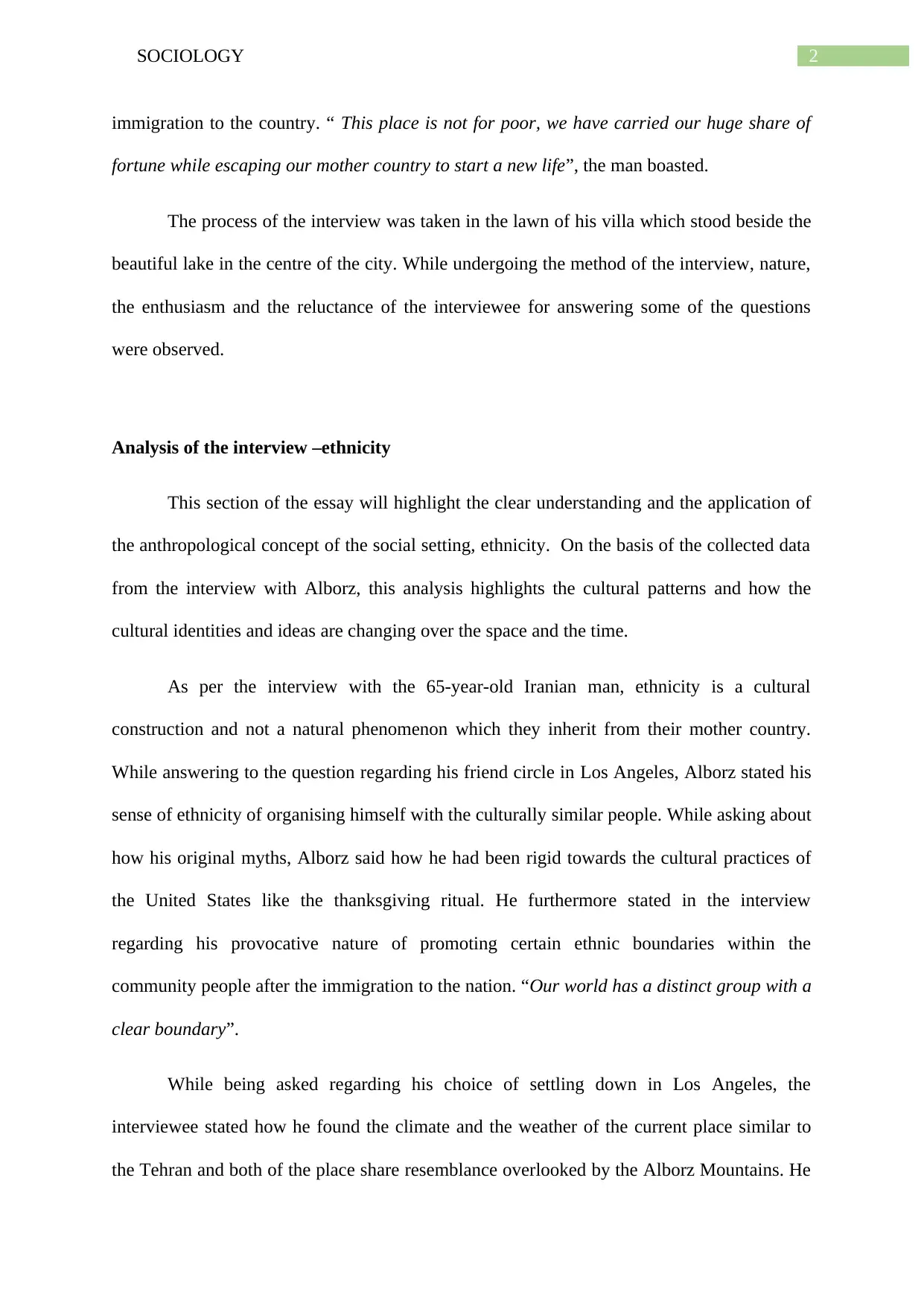
2SOCIOLOGY
immigration to the country. “ This place is not for poor, we have carried our huge share of
fortune while escaping our mother country to start a new life”, the man boasted.
The process of the interview was taken in the lawn of his villa which stood beside the
beautiful lake in the centre of the city. While undergoing the method of the interview, nature,
the enthusiasm and the reluctance of the interviewee for answering some of the questions
were observed.
Analysis of the interview –ethnicity
This section of the essay will highlight the clear understanding and the application of
the anthropological concept of the social setting, ethnicity. On the basis of the collected data
from the interview with Alborz, this analysis highlights the cultural patterns and how the
cultural identities and ideas are changing over the space and the time.
As per the interview with the 65-year-old Iranian man, ethnicity is a cultural
construction and not a natural phenomenon which they inherit from their mother country.
While answering to the question regarding his friend circle in Los Angeles, Alborz stated his
sense of ethnicity of organising himself with the culturally similar people. While asking about
how his original myths, Alborz said how he had been rigid towards the cultural practices of
the United States like the thanksgiving ritual. He furthermore stated in the interview
regarding his provocative nature of promoting certain ethnic boundaries within the
community people after the immigration to the nation. “Our world has a distinct group with a
clear boundary”.
While being asked regarding his choice of settling down in Los Angeles, the
interviewee stated how he found the climate and the weather of the current place similar to
the Tehran and both of the place share resemblance overlooked by the Alborz Mountains. He
immigration to the country. “ This place is not for poor, we have carried our huge share of
fortune while escaping our mother country to start a new life”, the man boasted.
The process of the interview was taken in the lawn of his villa which stood beside the
beautiful lake in the centre of the city. While undergoing the method of the interview, nature,
the enthusiasm and the reluctance of the interviewee for answering some of the questions
were observed.
Analysis of the interview –ethnicity
This section of the essay will highlight the clear understanding and the application of
the anthropological concept of the social setting, ethnicity. On the basis of the collected data
from the interview with Alborz, this analysis highlights the cultural patterns and how the
cultural identities and ideas are changing over the space and the time.
As per the interview with the 65-year-old Iranian man, ethnicity is a cultural
construction and not a natural phenomenon which they inherit from their mother country.
While answering to the question regarding his friend circle in Los Angeles, Alborz stated his
sense of ethnicity of organising himself with the culturally similar people. While asking about
how his original myths, Alborz said how he had been rigid towards the cultural practices of
the United States like the thanksgiving ritual. He furthermore stated in the interview
regarding his provocative nature of promoting certain ethnic boundaries within the
community people after the immigration to the nation. “Our world has a distinct group with a
clear boundary”.
While being asked regarding his choice of settling down in Los Angeles, the
interviewee stated how he found the climate and the weather of the current place similar to
the Tehran and both of the place share resemblance overlooked by the Alborz Mountains. He
⊘ This is a preview!⊘
Do you want full access?
Subscribe today to unlock all pages.

Trusted by 1+ million students worldwide
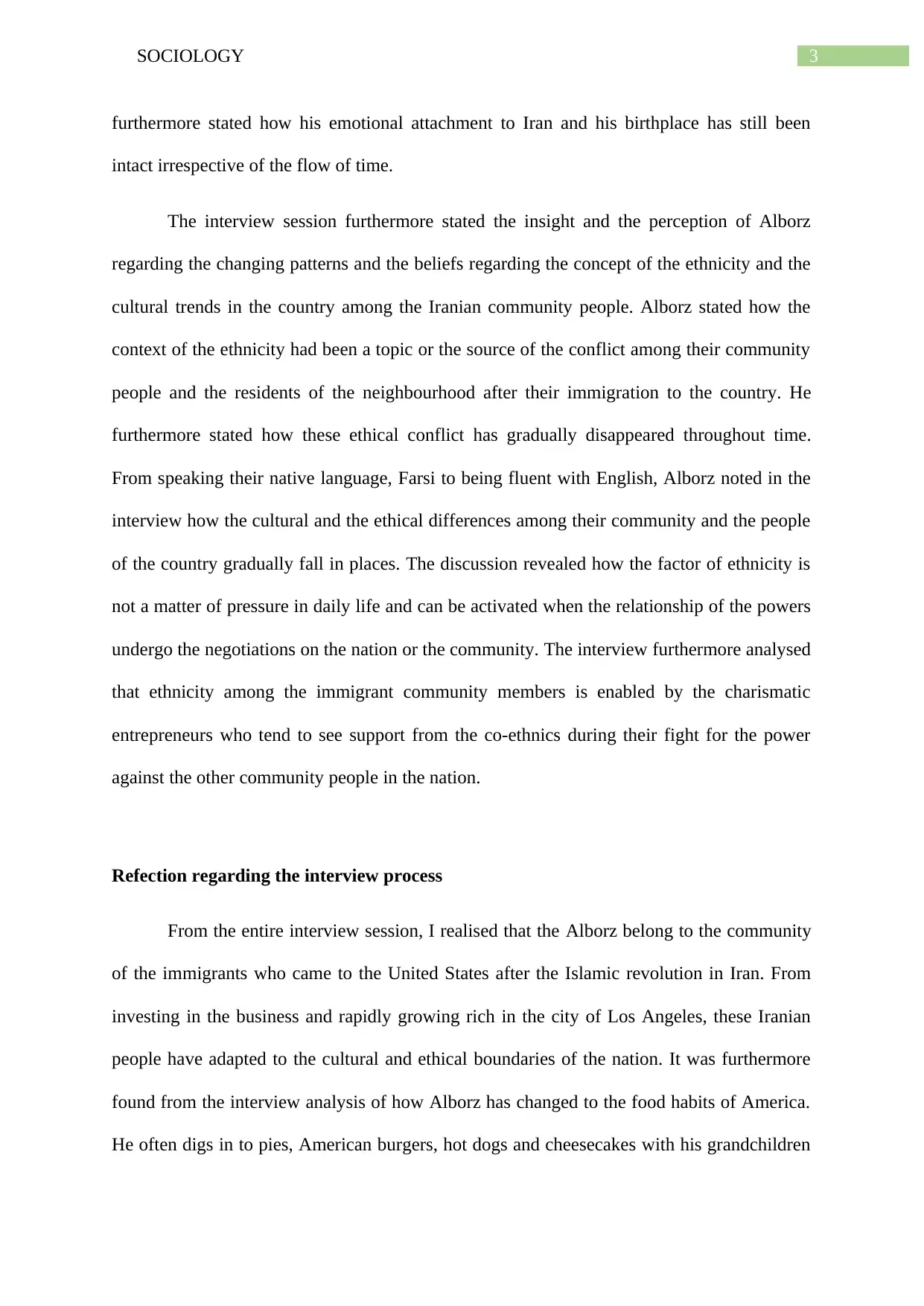
3SOCIOLOGY
furthermore stated how his emotional attachment to Iran and his birthplace has still been
intact irrespective of the flow of time.
The interview session furthermore stated the insight and the perception of Alborz
regarding the changing patterns and the beliefs regarding the concept of the ethnicity and the
cultural trends in the country among the Iranian community people. Alborz stated how the
context of the ethnicity had been a topic or the source of the conflict among their community
people and the residents of the neighbourhood after their immigration to the country. He
furthermore stated how these ethical conflict has gradually disappeared throughout time.
From speaking their native language, Farsi to being fluent with English, Alborz noted in the
interview how the cultural and the ethical differences among their community and the people
of the country gradually fall in places. The discussion revealed how the factor of ethnicity is
not a matter of pressure in daily life and can be activated when the relationship of the powers
undergo the negotiations on the nation or the community. The interview furthermore analysed
that ethnicity among the immigrant community members is enabled by the charismatic
entrepreneurs who tend to see support from the co-ethnics during their fight for the power
against the other community people in the nation.
Refection regarding the interview process
From the entire interview session, I realised that the Alborz belong to the community
of the immigrants who came to the United States after the Islamic revolution in Iran. From
investing in the business and rapidly growing rich in the city of Los Angeles, these Iranian
people have adapted to the cultural and ethical boundaries of the nation. It was furthermore
found from the interview analysis of how Alborz has changed to the food habits of America.
He often digs in to pies, American burgers, hot dogs and cheesecakes with his grandchildren
furthermore stated how his emotional attachment to Iran and his birthplace has still been
intact irrespective of the flow of time.
The interview session furthermore stated the insight and the perception of Alborz
regarding the changing patterns and the beliefs regarding the concept of the ethnicity and the
cultural trends in the country among the Iranian community people. Alborz stated how the
context of the ethnicity had been a topic or the source of the conflict among their community
people and the residents of the neighbourhood after their immigration to the country. He
furthermore stated how these ethical conflict has gradually disappeared throughout time.
From speaking their native language, Farsi to being fluent with English, Alborz noted in the
interview how the cultural and the ethical differences among their community and the people
of the country gradually fall in places. The discussion revealed how the factor of ethnicity is
not a matter of pressure in daily life and can be activated when the relationship of the powers
undergo the negotiations on the nation or the community. The interview furthermore analysed
that ethnicity among the immigrant community members is enabled by the charismatic
entrepreneurs who tend to see support from the co-ethnics during their fight for the power
against the other community people in the nation.
Refection regarding the interview process
From the entire interview session, I realised that the Alborz belong to the community
of the immigrants who came to the United States after the Islamic revolution in Iran. From
investing in the business and rapidly growing rich in the city of Los Angeles, these Iranian
people have adapted to the cultural and ethical boundaries of the nation. It was furthermore
found from the interview analysis of how Alborz has changed to the food habits of America.
He often digs in to pies, American burgers, hot dogs and cheesecakes with his grandchildren
Paraphrase This Document
Need a fresh take? Get an instant paraphrase of this document with our AI Paraphraser
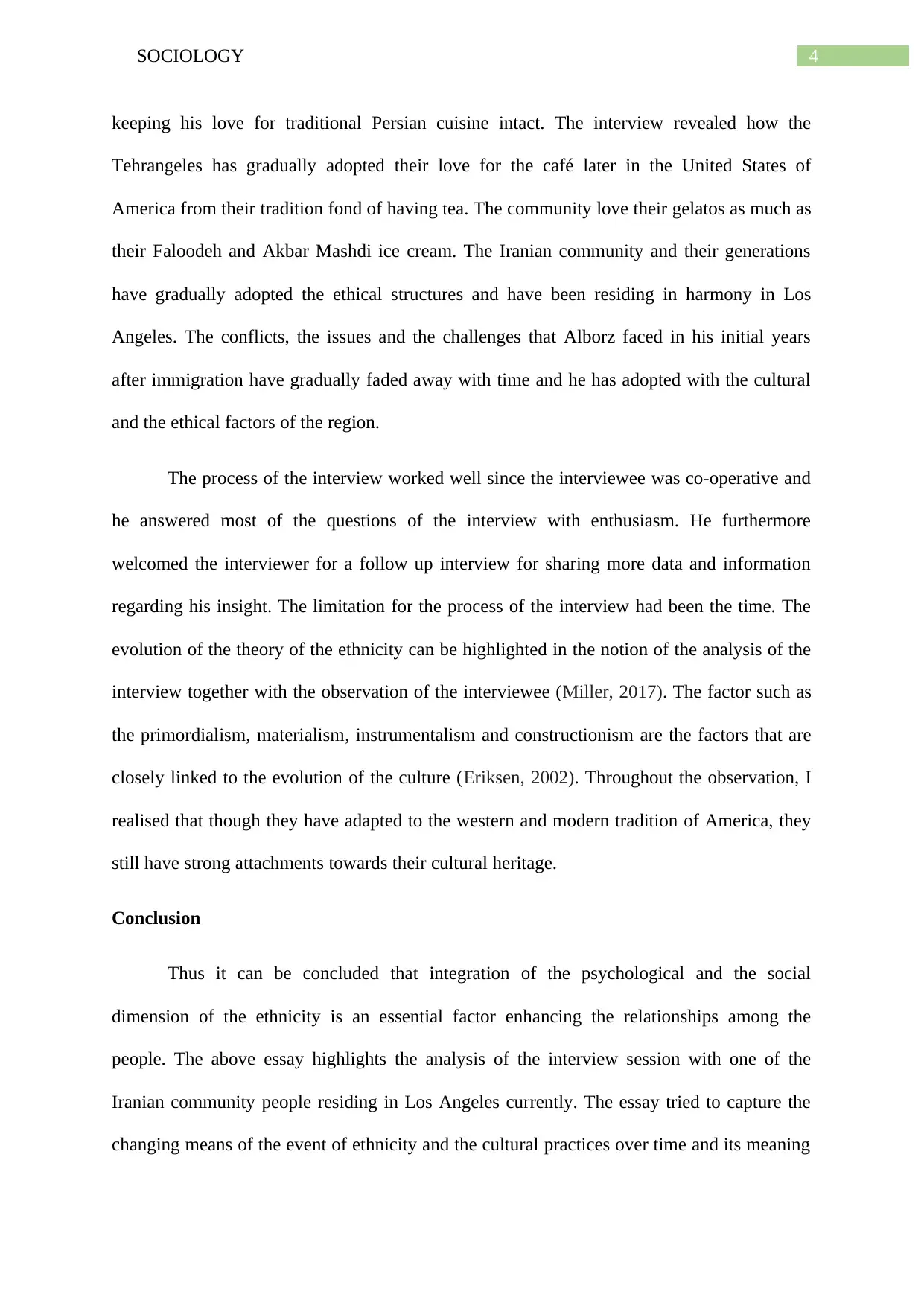
4SOCIOLOGY
keeping his love for traditional Persian cuisine intact. The interview revealed how the
Tehrangeles has gradually adopted their love for the café later in the United States of
America from their tradition fond of having tea. The community love their gelatos as much as
their Faloodeh and Akbar Mashdi ice cream. The Iranian community and their generations
have gradually adopted the ethical structures and have been residing in harmony in Los
Angeles. The conflicts, the issues and the challenges that Alborz faced in his initial years
after immigration have gradually faded away with time and he has adopted with the cultural
and the ethical factors of the region.
The process of the interview worked well since the interviewee was co-operative and
he answered most of the questions of the interview with enthusiasm. He furthermore
welcomed the interviewer for a follow up interview for sharing more data and information
regarding his insight. The limitation for the process of the interview had been the time. The
evolution of the theory of the ethnicity can be highlighted in the notion of the analysis of the
interview together with the observation of the interviewee (Miller, 2017). The factor such as
the primordialism, materialism, instrumentalism and constructionism are the factors that are
closely linked to the evolution of the culture (Eriksen, 2002). Throughout the observation, I
realised that though they have adapted to the western and modern tradition of America, they
still have strong attachments towards their cultural heritage.
Conclusion
Thus it can be concluded that integration of the psychological and the social
dimension of the ethnicity is an essential factor enhancing the relationships among the
people. The above essay highlights the analysis of the interview session with one of the
Iranian community people residing in Los Angeles currently. The essay tried to capture the
changing means of the event of ethnicity and the cultural practices over time and its meaning
keeping his love for traditional Persian cuisine intact. The interview revealed how the
Tehrangeles has gradually adopted their love for the café later in the United States of
America from their tradition fond of having tea. The community love their gelatos as much as
their Faloodeh and Akbar Mashdi ice cream. The Iranian community and their generations
have gradually adopted the ethical structures and have been residing in harmony in Los
Angeles. The conflicts, the issues and the challenges that Alborz faced in his initial years
after immigration have gradually faded away with time and he has adopted with the cultural
and the ethical factors of the region.
The process of the interview worked well since the interviewee was co-operative and
he answered most of the questions of the interview with enthusiasm. He furthermore
welcomed the interviewer for a follow up interview for sharing more data and information
regarding his insight. The limitation for the process of the interview had been the time. The
evolution of the theory of the ethnicity can be highlighted in the notion of the analysis of the
interview together with the observation of the interviewee (Miller, 2017). The factor such as
the primordialism, materialism, instrumentalism and constructionism are the factors that are
closely linked to the evolution of the culture (Eriksen, 2002). Throughout the observation, I
realised that though they have adapted to the western and modern tradition of America, they
still have strong attachments towards their cultural heritage.
Conclusion
Thus it can be concluded that integration of the psychological and the social
dimension of the ethnicity is an essential factor enhancing the relationships among the
people. The above essay highlights the analysis of the interview session with one of the
Iranian community people residing in Los Angeles currently. The essay tried to capture the
changing means of the event of ethnicity and the cultural practices over time and its meaning

5SOCIOLOGY
in the current date. Highlighting the context of the theory of the evolution, the essay states
how the immigrant's people of Iran have adapted to the cultural changes in the nation
throughout the period.
in the current date. Highlighting the context of the theory of the evolution, the essay states
how the immigrant's people of Iran have adapted to the cultural changes in the nation
throughout the period.
⊘ This is a preview!⊘
Do you want full access?
Subscribe today to unlock all pages.

Trusted by 1+ million students worldwide
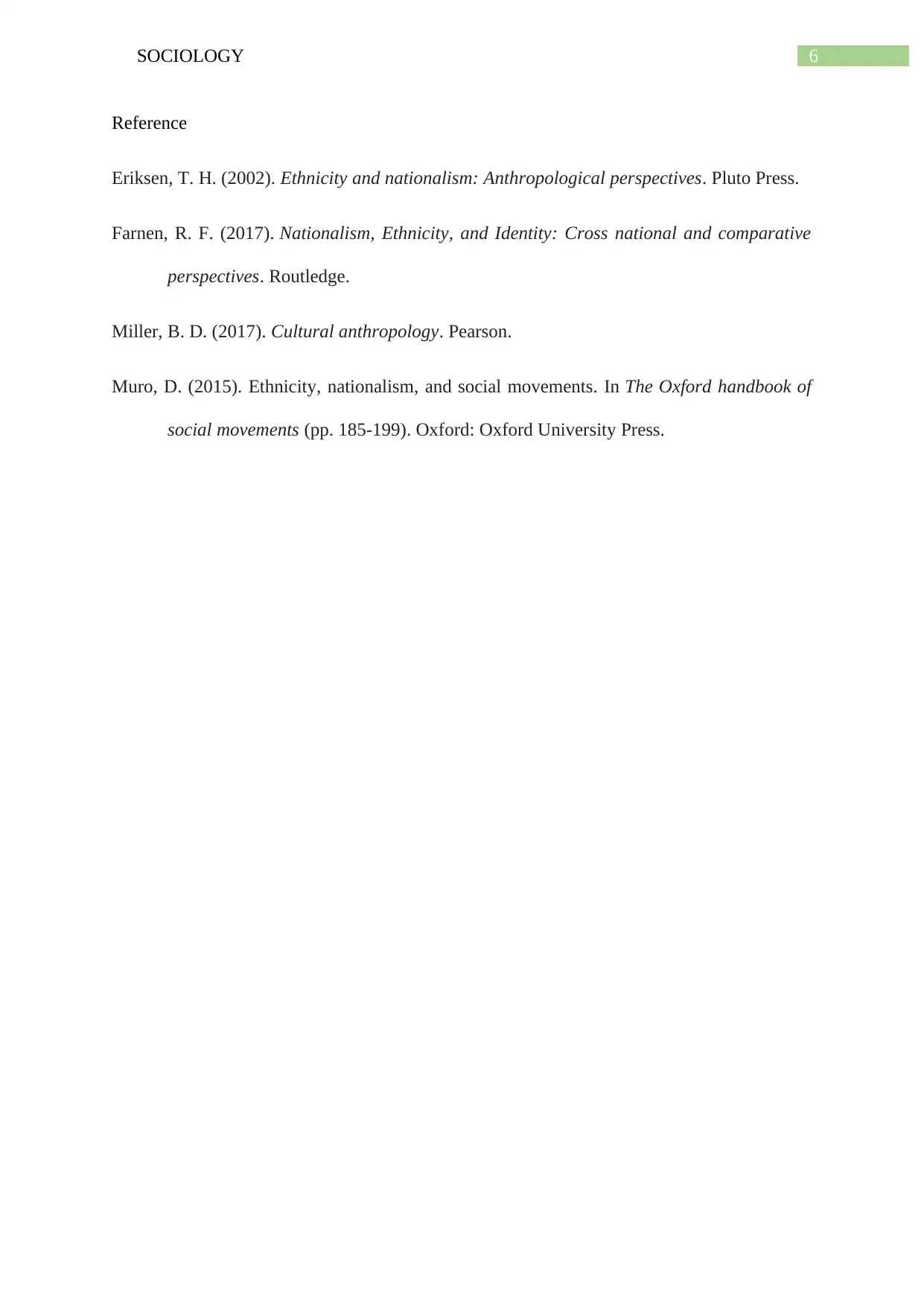
6SOCIOLOGY
Reference
Eriksen, T. H. (2002). Ethnicity and nationalism: Anthropological perspectives. Pluto Press.
Farnen, R. F. (2017). Nationalism, Ethnicity, and Identity: Cross national and comparative
perspectives. Routledge.
Miller, B. D. (2017). Cultural anthropology. Pearson.
Muro, D. (2015). Ethnicity, nationalism, and social movements. In The Oxford handbook of
social movements (pp. 185-199). Oxford: Oxford University Press.
Reference
Eriksen, T. H. (2002). Ethnicity and nationalism: Anthropological perspectives. Pluto Press.
Farnen, R. F. (2017). Nationalism, Ethnicity, and Identity: Cross national and comparative
perspectives. Routledge.
Miller, B. D. (2017). Cultural anthropology. Pearson.
Muro, D. (2015). Ethnicity, nationalism, and social movements. In The Oxford handbook of
social movements (pp. 185-199). Oxford: Oxford University Press.
1 out of 7
Your All-in-One AI-Powered Toolkit for Academic Success.
+13062052269
info@desklib.com
Available 24*7 on WhatsApp / Email
![[object Object]](/_next/static/media/star-bottom.7253800d.svg)
Unlock your academic potential
Copyright © 2020–2026 A2Z Services. All Rights Reserved. Developed and managed by ZUCOL.
